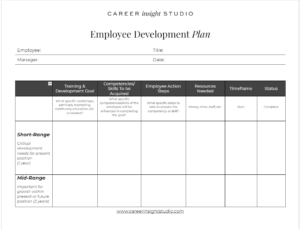Last week, we talked about the value of managers initiating career conversations in the workplace. (Including a downloadable 13-page guide to provide structure and support!) This week, let’s discuss this topic from the employee’s point of view. How can you, as an employee, launch these career conversations with confidence? Let’s talk about it.

In an ideal world, all organizations would provide both managers and employees with the time and resources needed to continually promote employee growth and education within the company.
But as we all know, initiating career conversations in the workplace can be put off for a variety of reasons. I’m guilty of this as well! It’s too easy to put your career aspirations on the back burner because of more time pressing work demands. Lack of time, pressing assignments and overwork can cause managers and their team members to put off looking at employees’ short and long term goals until the next quarter—perpetually.
But the truth is that career conversations don’t have to be rigid or only focused on long-term goals. It can be overwheling to think “what do I want to do in 5 years?”. Here’s a mindset shift to think about….what if you view your career conversation as an opportunity to dial up your job satisfaction short and long term? Simply discussing what lights you up at work, areas of interest and growth goals not only allows your manager to understand your interests but will set you up for more interesting assignments and growth opportunities in the future.
Guide to Effective Career Conversations with Your Manager
What’s the difference between a job and a career? A job is doing the work as expected. A career involves voluntary self-navigation. The decision to follow a specific career path isn’t just about waiting for opportunities to come your way—it’s about actively shaping your own professional journey.
By initiating these conversations, you are demonstrating proactive career management and fostering a supportive relationship with your manager. You are ensuring that your career development remains on track and aligned with your career aspirations AND the company’s strategic direction. Everyone wins.
Remember that career discussions don’t have to be focused on “climbing the ladder.” If you are relatively new in your role or enjoy what you are doing, you may choose to focus your career conversation on developing and learning within that role. Use the conversation to identify ways to strengthen your skills in a certain area or explore new areas of interest.
In short: these conversations don’t have to mean that you are unhappy or thinking of leaving. They are simply a tool to guide and support your professional growth.
How to Initiate and Navigate a Successful Career Conversation with Your Manager.
As noted above, these conversations don’t have to be rigid or follow a script. You are in the driver’s seat, and you can choose a tone and cadence that feels right for you. Take the following tips and make them your own!
1. Come Prepared
Before scheduling a meeting with your manager, take time to reflect so that you can provide perspective on your career interests and goals:
- A self-assessment: Identify your strengths, weaknesses, and accomplishments.
- Career goals: Where do you want to be in one, three or five years? What skills and competencies do you want to develop? What do you enjoy doing? How do you like to learn new things?
- Company alignment: Understand the organization’s goals and challenges. Are there skills and competencies that are important to achieve the business objectives?
2. Request a Dedicated Meeting
Traditionally, employees are encouraged to take ownership of their career discussions and initiate this time with your manager.
- Be intentional: Avoid having career discussions in routine meetings (or worse, standing in the hallway, unprepared). Request a session focused solely on your career growth and development.
- Schedule out: Ideally, a formal discussion would take place once a year, with more casual check-in meetings if needed to discuss progress or needed support.
“Your career is your business. It’s time for you to manage it as a CEO.” – Dorit Sher
3. Structure the Conversation
Begin the meeting by guiding the discussion towards:
- Highlighting your achievements and/or development progress: Showcase your contributions and how they align with company success. If you are having a follow up conversation, you can share progress you have made since the last conversation.
- Clarifying your goals & interests: Discuss your career aspirations and ask how the organization might support them.
4. Document: Develop a Forward-Looking Plan
After the conversation, it’s helpful to document your action plan. If your company has a career development plan template, use that or feel free to download this free template. When you discuss your action plan, it’s helpful to align with your manager on ways to set you up for success:
- Develop SMART goals: Specific, Measurable, Achievable, Relevant, Time-bound objectives.
- Action steps: Together, list the skills you’d like to acquire, potential projects to undertake, key relationships you want to build and any support needed.
5. Follow Up
Keep the momentum going:
- Review: Schedule periodic check-ins with your manager to track progress and adjust your goals as needed.
- Feedback: Seek feedback on your performance and request areas for improvement relative to your development plan.
6. Sample Questions to Ask Your Manager
To guide your discussion, consider asking:
- What opportunities do you see for my growth within the organization?
- How can I further contribute to the team or company objectives?
- What skills or experiences should I focus on developing?
- Are there upcoming projects or initiatives where my skills could be valuable?
By making time for proactive career conversations, you demonstrate initiative and commitment to your professional growth. Remember, your career journey is a partnership between you and your manager—consider it an investment in yourself and one you don’t want to leave up to chance!
If you want help in clarifying your career goals or prepping for a meaningful career conversation with your manager, feel free to book a private 1:1 session with me for support. Visit Mentor Minutes to schedule a complementary discovery call.
Thanks for reading!



